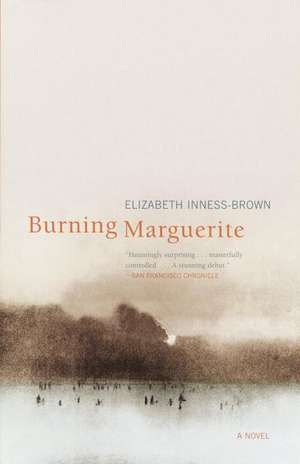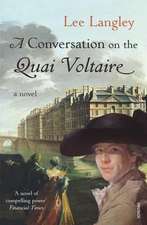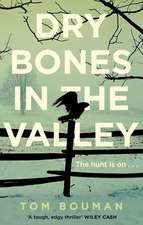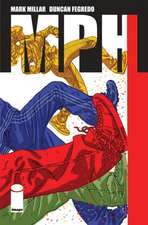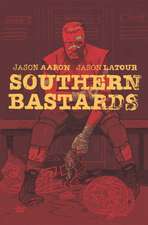Burning Marguerite
Autor Elizabeth Inness-Brownen Limba Engleză Paperback – 30 apr 2003
As James Jack sets out to fulfill Marguerite’s unusual last wishes, the narrative unveils the secrets of their pasts. It arcs from Depression-era New Orleans to a barren New England island at the turn of the century, from an illicit passion and an unforgivable crime to the relationship between a small boy and a tough, reclusive woman who turns out to possess an unsuspected capacity for love.
Preț: 124.59 lei
Nou
Puncte Express: 187
Preț estimativ în valută:
23.84€ • 24.89$ • 19.69£
23.84€ • 24.89$ • 19.69£
Carte disponibilă
Livrare economică 25 martie-08 aprilie
Preluare comenzi: 021 569.72.76
Specificații
ISBN-13: 9780375726224
ISBN-10: 0375726225
Pagini: 256
Dimensiuni: 132 x 204 x 15 mm
Greutate: 0.18 kg
Editura: Vintage Publishing
ISBN-10: 0375726225
Pagini: 256
Dimensiuni: 132 x 204 x 15 mm
Greutate: 0.18 kg
Editura: Vintage Publishing
Notă biografică
Elizabeth Inness-Brown is the author of two acclaimed collections of short stories, Satin Palms and Here. Raised in the North Country of New York State, she now teaches writing at Saint Michael’s College and lives with her husband and young son on South Hero, an island in Lake Champlain, Vermont.
Extras
One
The fire had gone out not long before he woke. The air in the cabin was cold enough to chill his nose but not cold enough to show his breath. The stove, when he reached out, was still as warm as his hand.
Inside the sleeping bag, his body had generated its own heat, and the goose down kept it there, cocooning him. It was good to know he could survive a night in the cabin if he wanted to, that he could survive even the deep cold of a night in February. The only difficulty was convincing himself to leave the warmth of the bag.
He did it by imagining the smell of coffee. Down at the house, Tante would have the coffee percolating on the stove, boiling it with the chicory that gave it a burnt taste that went away only when he stirred in sugar and filled his mug to the lip with milk. The kitchen would be warm, the fire hissing and popping. Tante would have forgiven him by now, as he had already forgiven her. She would be ready for him to come back, she would not say a word, and they would go on as ever. After thirty-five years, after the whole of his life and a third of hers, forgiveness came easily to them, and often. The passing of time pressed them to it, made nothing else important enough to stop it. All you ever really have is time; she taught him that.
He dressed inside the bag, took his boots from its bottom where he'd kept them warm, climbed out and put them on. Opened the stove door, stirred the ashes, made sure the fire was out. Rolled up the sleeping bag and put it into ripstop plastic, and put that into more plastic, and put that into the cupboard to protect it from mice and squirrels. Laid a tarp over the cot to keep the dust and droppings off. Cast his eye about the place. Pulled his coat from the hook and put it on; pulled his hat down to his eyes, wrapped the scarf around his neck and face, stuck his hands into his gloves, and went out the door into the cold.
It was first light, a winter dawn. If he'd wanted to take the time to climb the ridge, he could have seen the blush of sunrise warm above the horizon. But here on the western slope the light was colorless, flat. His footsteps cracked the icy air. Judging from the way his breath hovered, the temperature was well below zero.
Around him the trees seemed to hold themselves still. They looked almost dead, like the trees onstage in a high school play. His high school play. Because he was good with wood and because he had a truck and because he could drive a nail straight, he had been asked to design the set. He had made a forest of trees, bringing summer into the drab auditorium. Each of the three nights, he had refreshed the dream with new-cut saplings, their leaves kept green by the moist medium in which they stood. But as powerful as the illusion was, the trees had looked dead to him. He could tell a live tree when he saw one, and those trees had looked dead, more dead even than these looked in the dead of winter.
The first slope down from the cabin to the house was slick, thin snow over leaves. He reached his hands ahead to the trees, grabbed their brittle limbs to steady himself. Twigs broke off in his hands. To inhale froze his nostrils, to exhale thawed them. The air was raw on his cheeks and lips.
When the slope leveled, he relaxed his caution. In winter you could see deep into the woods. He watched for what he might see, for what might be there, looking for nothing in particular. Sometimes you caught deer off guard, stripping the bark from young trees, or spotted woodpeckers after you heard them, drilling old trees in search of frozen insects. He was in no hurry; he had no place to be, no job to do but keeping himself and Tante warm. He liked that about being a carpenter in winter; he liked that about winter itself. The way everything slowed down, became elemental. Nothing mattered but staying warm.
The path widened. This was the old quarry road. He came into it where it hooked left toward the lower quarry, hidden some half mile back. Downhill, the road was still open; he kept it that way with his truck, to make it easier to bring down firewood. But toward the quarry the road was recognizable only because the growth was younger and thicker than the rest of the woods. Most people would have missed it.
A hum came, first soft and distant, then louder. A single-engine plane passed overhead, just under the low clouds.
He glanced left, up the overgrown road, and saw something. Something red against something white. He almost dismissed it. But the red glowed fresh and bright, and the thought that some animal might be hurt and bleeding drew him a few steps into the woods.
He kept waiting for what he was seeing to make sense to him. But even when he recognized the red rosebuds on the white flannel, even when he knew what they were, his mind refused to comprehend what his eyes saw, concocting instead other reasons that Tante's nightgown might be out there in the woods. The wind, a wild dog, birds. Something had taken the gown from the clothesline, had dragged it here and left it. For several long minutes his mind did not accept what else was there, accepted only the nightgown amid some strangely shaped and tinted rocks. Rocks whitened by hoarfrost. Rocks that gave the impression of a face, rocks shaped like fingers, a calf, a foot.
Then like a puzzle it came together, and he saw the picture complete. Tante. One leg bent under her, the other foot bare. Her torso twisted. Her arm flung over her eyes so that he could not see if they were open. The sleeve of the nightgown drawn back, her arm exposed: the web of blue veins, the loose flesh, the bones of her arm from wrist to elbow, the hand with only four fingers. The nightgown clean and white against the ground. Like fresh snow with roses leaping red and vivid from it.
He sat on the ground next to her. Tried not to look at her. Took off a glove and reached toward her. Where his finger touched, an oval melted from her hand. But the flesh was cold, no warmer than the ground she lay on.
He wanted to take her into his arms then, hold her to him. Warm her. Breathe life back into her. But he couldn't.
When he felt his own hand freezing, he stood again, put his glove back on, and squatted to put his arms beneath her. It was like lifting firewood. She was a rigid, ungainly corpse.
He moved carefully to avoid trees, to keep from hitting her against them, her outstretched arm, her foot. More than once he slipped and nearly fell. He did not look down into her ancient face, afraid of what he might see.
He took her back up to the cabin, the nearer of two places; took her back to his bed. There, he removed the tarp and laid her head on the pillow where his own had rested, not an hour before.
The sheriff's office was in a new brick building, which it shared with the post office and a video store. A flag snapped against a flagpole planted in a concrete circle in the parking lot. Between two white lines, a black car gleamed. Otherwise the lot was empty.
Stepping into the glass entryway was like stepping into an airlock or one of those radiation baths in a science fiction movie. Somewhere a machine roared ferociously, filling the box with hot air, a buffer zone between the cold outside and the warm inside. A place to preheat visitors, so they would not bring the cold inside with them.
In this space, just opposite a handwritten sign that read no smoking, stood a woman smoking a cigarette, wrapped up and slouching in a big winter coat, her hair and part of her face hidden by a hat. James spoke to her. "Cold out," he said. Two words together was all he could manage. She only nodded and took another deep drag, looking out into the parking lot as if she were expecting someone else.
He crossed the space in two steps. Opened the inner door. Stepped into the hallway with its shining linoleum floor. Found the door labeled county sheriff. Opened it. Stepped inside.
The sheriff's office had freshly painted green walls. There were no curtains on the broad windows that looked out on the parking lot; the blinds were raised up. Behind a long counter another woman sat at a desk, flipping the glossy pages of a magazine. She was not in uniform. He did not know her, but she looked familiar, about as familiar as the woman in the entryway.
It had been a long time since he had been to the sheriff's office. Things had changed. The woman's desk was sleek and modern, U-shaped. Behind her glowed the blue screen of a computer, swimming with red and yellow fish. Or birds. He couldn't tell.
James cleared his throat; the woman flipped a page. James thought he saw lawn mowers, other bright red-machinery. Tractors. He thought it must be a farm catalog. "May I help you?"she said, not looking up.
"Sheriff here?"
"No," she said, and now looked up. "Oh," she said, as if she knew him or as if the sight of him had startled her. "Can I help you?" She rephrased the question as if it meant something different.
He hesitated to speak, uncertain how to put it. "It's a death," he said.
The woman smiled. "Sure," she said. She kept smiling and looking at him, as if waiting for something. When he didn't say anything more, she gave a little laugh. "Murder, suicide, or accident? Hard to tell these days, isn't it? They just seem to throw themselves into the road. I hit two raccoons just the other day. And my uncle hit a moose, up there on the mainland. Totaled his truck."
James shook his head. "No," he said.
Keeping a finger at her place, the woman shut the catalog, swiveled her chair to the left, and stood. Her clothing struck him as peculiar for a woman who worked in a sheriff's office: a long white sweater over black pants, and shiny black shoes that clacked against the floor. Her blond hair was short enough to reveal her ears; her earrings were silver birds that hung down from chains and swung against her neck. She looked like someone who should be working in a department store. "What happened?" she asked, coming toward him, the catalog still in her hand, her expression curious.
From the Hardcover edition.
The fire had gone out not long before he woke. The air in the cabin was cold enough to chill his nose but not cold enough to show his breath. The stove, when he reached out, was still as warm as his hand.
Inside the sleeping bag, his body had generated its own heat, and the goose down kept it there, cocooning him. It was good to know he could survive a night in the cabin if he wanted to, that he could survive even the deep cold of a night in February. The only difficulty was convincing himself to leave the warmth of the bag.
He did it by imagining the smell of coffee. Down at the house, Tante would have the coffee percolating on the stove, boiling it with the chicory that gave it a burnt taste that went away only when he stirred in sugar and filled his mug to the lip with milk. The kitchen would be warm, the fire hissing and popping. Tante would have forgiven him by now, as he had already forgiven her. She would be ready for him to come back, she would not say a word, and they would go on as ever. After thirty-five years, after the whole of his life and a third of hers, forgiveness came easily to them, and often. The passing of time pressed them to it, made nothing else important enough to stop it. All you ever really have is time; she taught him that.
He dressed inside the bag, took his boots from its bottom where he'd kept them warm, climbed out and put them on. Opened the stove door, stirred the ashes, made sure the fire was out. Rolled up the sleeping bag and put it into ripstop plastic, and put that into more plastic, and put that into the cupboard to protect it from mice and squirrels. Laid a tarp over the cot to keep the dust and droppings off. Cast his eye about the place. Pulled his coat from the hook and put it on; pulled his hat down to his eyes, wrapped the scarf around his neck and face, stuck his hands into his gloves, and went out the door into the cold.
It was first light, a winter dawn. If he'd wanted to take the time to climb the ridge, he could have seen the blush of sunrise warm above the horizon. But here on the western slope the light was colorless, flat. His footsteps cracked the icy air. Judging from the way his breath hovered, the temperature was well below zero.
Around him the trees seemed to hold themselves still. They looked almost dead, like the trees onstage in a high school play. His high school play. Because he was good with wood and because he had a truck and because he could drive a nail straight, he had been asked to design the set. He had made a forest of trees, bringing summer into the drab auditorium. Each of the three nights, he had refreshed the dream with new-cut saplings, their leaves kept green by the moist medium in which they stood. But as powerful as the illusion was, the trees had looked dead to him. He could tell a live tree when he saw one, and those trees had looked dead, more dead even than these looked in the dead of winter.
The first slope down from the cabin to the house was slick, thin snow over leaves. He reached his hands ahead to the trees, grabbed their brittle limbs to steady himself. Twigs broke off in his hands. To inhale froze his nostrils, to exhale thawed them. The air was raw on his cheeks and lips.
When the slope leveled, he relaxed his caution. In winter you could see deep into the woods. He watched for what he might see, for what might be there, looking for nothing in particular. Sometimes you caught deer off guard, stripping the bark from young trees, or spotted woodpeckers after you heard them, drilling old trees in search of frozen insects. He was in no hurry; he had no place to be, no job to do but keeping himself and Tante warm. He liked that about being a carpenter in winter; he liked that about winter itself. The way everything slowed down, became elemental. Nothing mattered but staying warm.
The path widened. This was the old quarry road. He came into it where it hooked left toward the lower quarry, hidden some half mile back. Downhill, the road was still open; he kept it that way with his truck, to make it easier to bring down firewood. But toward the quarry the road was recognizable only because the growth was younger and thicker than the rest of the woods. Most people would have missed it.
A hum came, first soft and distant, then louder. A single-engine plane passed overhead, just under the low clouds.
He glanced left, up the overgrown road, and saw something. Something red against something white. He almost dismissed it. But the red glowed fresh and bright, and the thought that some animal might be hurt and bleeding drew him a few steps into the woods.
He kept waiting for what he was seeing to make sense to him. But even when he recognized the red rosebuds on the white flannel, even when he knew what they were, his mind refused to comprehend what his eyes saw, concocting instead other reasons that Tante's nightgown might be out there in the woods. The wind, a wild dog, birds. Something had taken the gown from the clothesline, had dragged it here and left it. For several long minutes his mind did not accept what else was there, accepted only the nightgown amid some strangely shaped and tinted rocks. Rocks whitened by hoarfrost. Rocks that gave the impression of a face, rocks shaped like fingers, a calf, a foot.
Then like a puzzle it came together, and he saw the picture complete. Tante. One leg bent under her, the other foot bare. Her torso twisted. Her arm flung over her eyes so that he could not see if they were open. The sleeve of the nightgown drawn back, her arm exposed: the web of blue veins, the loose flesh, the bones of her arm from wrist to elbow, the hand with only four fingers. The nightgown clean and white against the ground. Like fresh snow with roses leaping red and vivid from it.
He sat on the ground next to her. Tried not to look at her. Took off a glove and reached toward her. Where his finger touched, an oval melted from her hand. But the flesh was cold, no warmer than the ground she lay on.
He wanted to take her into his arms then, hold her to him. Warm her. Breathe life back into her. But he couldn't.
When he felt his own hand freezing, he stood again, put his glove back on, and squatted to put his arms beneath her. It was like lifting firewood. She was a rigid, ungainly corpse.
He moved carefully to avoid trees, to keep from hitting her against them, her outstretched arm, her foot. More than once he slipped and nearly fell. He did not look down into her ancient face, afraid of what he might see.
He took her back up to the cabin, the nearer of two places; took her back to his bed. There, he removed the tarp and laid her head on the pillow where his own had rested, not an hour before.
The sheriff's office was in a new brick building, which it shared with the post office and a video store. A flag snapped against a flagpole planted in a concrete circle in the parking lot. Between two white lines, a black car gleamed. Otherwise the lot was empty.
Stepping into the glass entryway was like stepping into an airlock or one of those radiation baths in a science fiction movie. Somewhere a machine roared ferociously, filling the box with hot air, a buffer zone between the cold outside and the warm inside. A place to preheat visitors, so they would not bring the cold inside with them.
In this space, just opposite a handwritten sign that read no smoking, stood a woman smoking a cigarette, wrapped up and slouching in a big winter coat, her hair and part of her face hidden by a hat. James spoke to her. "Cold out," he said. Two words together was all he could manage. She only nodded and took another deep drag, looking out into the parking lot as if she were expecting someone else.
He crossed the space in two steps. Opened the inner door. Stepped into the hallway with its shining linoleum floor. Found the door labeled county sheriff. Opened it. Stepped inside.
The sheriff's office had freshly painted green walls. There were no curtains on the broad windows that looked out on the parking lot; the blinds were raised up. Behind a long counter another woman sat at a desk, flipping the glossy pages of a magazine. She was not in uniform. He did not know her, but she looked familiar, about as familiar as the woman in the entryway.
It had been a long time since he had been to the sheriff's office. Things had changed. The woman's desk was sleek and modern, U-shaped. Behind her glowed the blue screen of a computer, swimming with red and yellow fish. Or birds. He couldn't tell.
James cleared his throat; the woman flipped a page. James thought he saw lawn mowers, other bright red-machinery. Tractors. He thought it must be a farm catalog. "May I help you?"she said, not looking up.
"Sheriff here?"
"No," she said, and now looked up. "Oh," she said, as if she knew him or as if the sight of him had startled her. "Can I help you?" She rephrased the question as if it meant something different.
He hesitated to speak, uncertain how to put it. "It's a death," he said.
The woman smiled. "Sure," she said. She kept smiling and looking at him, as if waiting for something. When he didn't say anything more, she gave a little laugh. "Murder, suicide, or accident? Hard to tell these days, isn't it? They just seem to throw themselves into the road. I hit two raccoons just the other day. And my uncle hit a moose, up there on the mainland. Totaled his truck."
James shook his head. "No," he said.
Keeping a finger at her place, the woman shut the catalog, swiveled her chair to the left, and stood. Her clothing struck him as peculiar for a woman who worked in a sheriff's office: a long white sweater over black pants, and shiny black shoes that clacked against the floor. Her blond hair was short enough to reveal her ears; her earrings were silver birds that hung down from chains and swung against her neck. She looked like someone who should be working in a department store. "What happened?" she asked, coming toward him, the catalog still in her hand, her expression curious.
From the Hardcover edition.
Recenzii
“Vivid yet concise, Inness-Brown’s language burns away all but the essence of her story.” —The New York Times Book Review
“Takes the concept of motherhood . . . into the realm of poetry. . . . Reminiscent of Flannery O’Connor with a touch of Nathaniel Hawthorne.” —Philadelphia Inquirer
“Densely-layered . . . dramatic. . . . Inness-Brown possesses an assured touch for conveying the vivid harshness of her setting.” —The Miami Herald
“Though written in visual, spare prose, there’s nothing simple about this story. . . . Filled with haunting places and beautifully drawn characters, Burning Marguerite is a sterling novel.” —The Baltimore Sun
“Hauntingly surprising . . . masterfully controlled. . . . A stunning debut.” —San Francisco Chronicle
“[The characters’] stories unfold in a combination of grand sweep and everyday detail. . . and indelibility but reminds us that even everyday life. . . can lead to epic crossroads—and beautifully written novels.” —The Chicago Tribune
“This careful interweaving of past and present, of death and of the life that preceded it, is masterfully conceived and structured.” —The Trenton Times
“Elizabeth Inness-Brown proves herself already a master of description.” —Time Out New York
“To read this book is to feel the quiet at its center, like a cathedral, empty but filled with the wound of silence. At its heart is an elegant and understated examination of the obligations and endurance of love.” —The Times-Picayune
“The world is filled with tales of a mother’s love, but few as wistful or wise as Burning Marguerite. Elizabeth Inness-Brown knows exactly what magic brims in a mother’s—and, yes, a son’s—heart.” —Chris Bohjalian, author of The Buffalo Soldier and Midwives
“[Inness-Brown’s] descriptive writing is rich and evocative. The reader might actually shiver at her descriptions of winter in Vermont and perspire at those of summer in New Orleans.” —The Roanoke Times
“Finishing Burning Marguerite was a bittersweet experience. I look forward to future novels by this intriguing and very talented writer.” —The Anniston Star
“Burning Marguerite is a novel of hidden things, a book with sweeping range, intense feeling, delicate detail. It catches you in the web of its first pages and will not let go. It is utterly wonderful.” —Frederick Barthelme
“Takes the concept of motherhood . . . into the realm of poetry. . . . Reminiscent of Flannery O’Connor with a touch of Nathaniel Hawthorne.” —Philadelphia Inquirer
“Densely-layered . . . dramatic. . . . Inness-Brown possesses an assured touch for conveying the vivid harshness of her setting.” —The Miami Herald
“Though written in visual, spare prose, there’s nothing simple about this story. . . . Filled with haunting places and beautifully drawn characters, Burning Marguerite is a sterling novel.” —The Baltimore Sun
“Hauntingly surprising . . . masterfully controlled. . . . A stunning debut.” —San Francisco Chronicle
“[The characters’] stories unfold in a combination of grand sweep and everyday detail. . . and indelibility but reminds us that even everyday life. . . can lead to epic crossroads—and beautifully written novels.” —The Chicago Tribune
“This careful interweaving of past and present, of death and of the life that preceded it, is masterfully conceived and structured.” —The Trenton Times
“Elizabeth Inness-Brown proves herself already a master of description.” —Time Out New York
“To read this book is to feel the quiet at its center, like a cathedral, empty but filled with the wound of silence. At its heart is an elegant and understated examination of the obligations and endurance of love.” —The Times-Picayune
“The world is filled with tales of a mother’s love, but few as wistful or wise as Burning Marguerite. Elizabeth Inness-Brown knows exactly what magic brims in a mother’s—and, yes, a son’s—heart.” —Chris Bohjalian, author of The Buffalo Soldier and Midwives
“[Inness-Brown’s] descriptive writing is rich and evocative. The reader might actually shiver at her descriptions of winter in Vermont and perspire at those of summer in New Orleans.” —The Roanoke Times
“Finishing Burning Marguerite was a bittersweet experience. I look forward to future novels by this intriguing and very talented writer.” —The Anniston Star
“Burning Marguerite is a novel of hidden things, a book with sweeping range, intense feeling, delicate detail. It catches you in the web of its first pages and will not let go. It is utterly wonderful.” —Frederick Barthelme
Descriere
Inness-Brown's ecstatically received first novel is a brilliant narrative in which two lives are revealed and notions of motherhood, loyalty, love, and perhaps death itself, are examined.
